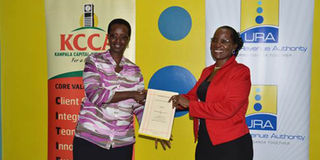URA, KCCA sign agreement to hunt down tax defaulters

URA commissioner general Allen Kagina (L) and KCCA executive director Jennifer Musisi exchange the signed Memorandum of Understanding in Kampala earlier in the week. PHOTO BY RACHEL MABALA
Kampala.
Uganda Revenue Authority (URA) and Kampala Capital City Authority (KCCA) have signed a Memorandum of Undestanding (MoU) that will allow them to jointly hunt down people or traders who refuse to pay taxes.
The MoU between the two institutions is also meant to increase the number of people paying taxes, especially those in the informal sector.
Speaking during the signing of the MoU earlier in the week, URA Commissioner General Allen Kagina said although the two were already collaborating, it was largely on an informal basis.
Operations made easy
She said: “This agreement will make it easy for our operations, protect business information and expand tax register.”
According to URA, traders have already started complying and about Shs4 billion, out of about Shs13 billion expected out of this arrangement, has been collected.
“With this collaboration, many traders are becoming visible on the system. And it is also exposing landlords who evade taxes,” Ms Kagina said.
KCCA executive director Jennifer Musisi said the collaboration will not only save deployment of additional resources and manpower but will also increase revenue collections.
She said: “The KCCA Act stipulates that we get support from sister organisations like URA. And in addition, we have similarities in our strategies, human resource development and revenue collection—so working together makes sense.”
However, economic analyst Prof Augustus Nuwagaba argue that this arrangement should have happened ages ago. He said good systems have seamless coordination, something that still lacks in Uganda.
URA seeking to widen tax base, increase revenue collections
The Taxpayer Registration Expansion Project (TREP) is targeting 100,000 taxpayers into tax bracket, outreach and enforcement activities around Kampala in conjunction with Kampala Capital City Authority and URSB. TREP is already in high gear aiming at widening the tax base, increasing revenue collections, minimising cost of doing business and improving tax compliance. So far Shs4bilion has been collected.
URA is expected to collect Shs8.5 billion by close of the financial year in June but is struggling with a deficit of Shs331 billion. With measures such as tightening leakage within its system, increased surveillance and sharing information on cargos among the EAC members states stands, the tax body hopes to boost revenue collections.
KACITA’s view
Kampala City Traders Association (Kacita) leadership has remained skeptical saying that although this is a good move, the two bodies have caused the traders more suffering than happiness.
The City traders claim that the two institutions have not only roughed them up but issued them with tax assessments that are inflated.




